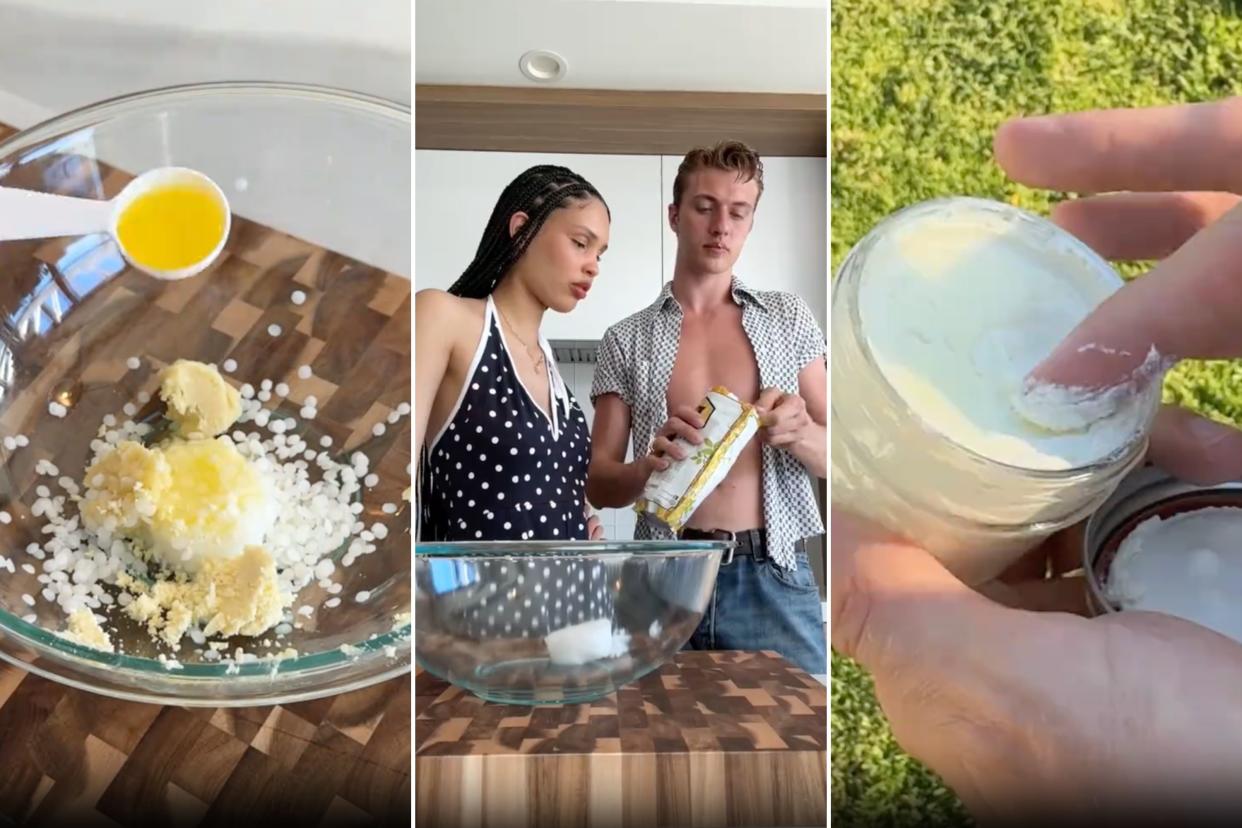TikToker Nara Smith made her own sunscreen. Don’t try this at home.

Model and content creator Nara Smith is inspiring audiences to try their hands at making cereal from scratch, DIY-ing throat lozenges and whipping up batches of toothpaste from bentonite clay, baking soda and peppermint essential oil. But will her latest video with husband, Lucky Blue Smith, get people to make their own sunscreen?
Let’s get you caught up:
Who are these people? Well, Nara is a 22-year-old model, influencer and mother of three, married to fellow model Lucky. While he had prior fame, Nara gained a following on TikTok for her extravagant (and soothing) cooking videos. She became synonymous with the so-called trad wife trend, the latest incarnation of the traditional homemaker. Lucky frequently appears on her page and is followed by 8.1 million people.
The pair posted a video on June 25 sharing a recipe for homemade sunscreen. “We all burn pretty easily, so we went with something with a little bit more SPF,” said Nara.
The recipe used 6 ingredients: coconut oil, beeswax, shea butter, cocoa butter, jojoba oil and zinc oxide powder.
Nara claimed that the product “went on so smooth and didn’t leave a white cast.” She didn’t mention how effective it was at protecting the skin or preventing sunburn.
The couple is the latest of a number of influencers to share sunscreen recipes. One controversial figure, Dr. Paul Saladino, previously faced backlash for claiming his animal-based sunscreen is “one hundred million billion zillion times better than the traditional sunscreens.”
What’s wrong with homemade sunscreen?
There’s no way to tell if it’s doing its job. And it most likely isn’t.
“Homemade sunscreens are generally not effective,” Dr. Hannah Kopelman, a dermatologist at Kopelman Aesthetic Surgery, tells Yahoo Life. “The efficacy of sunscreen depends on its ability to block or absorb UV radiation, which requires specific ingredients in precise formulations. Commercial sunscreens undergo rigorous testing to ensure they provide broad-spectrum protection and have a verified SPF rating.” SPF stands for sun protection factor, which is a measure of how well a sunscreen protects against sunburn, according to the American Academy of Dermatology (AAD). The AAD recommends using SPF 30 or higher, which can’t be determined at home. “Homemade sunscreens lack this testing and regulation, making it impossible to ensure consistent and adequate protection.” says Kopelman.
Regarding Nara and Lucky’s homemade sunscreen specifically, Dr. Mina Amin, a Los Angeles-based dermatologist, says there are “many issues” with its ingredients.
“Coconut oil and jojoba oil can draw in the sun and can actually lead to burns. Beeswax, shea butter and cocoa butter are meant to be hydrating, but have no efficacy in protecting against the sun,” she tells Yahoo Life.
The same goes for Saladino’s recipe, which includes tallow (aka rendered animal fat), which Kopelman says may have a moisturizing component and include some vitamin A, D, K and E, but “won’t be protective against the sun.” There’s also a risk of bacterial contamination or skin irritation from the animal protein.
In these and most other recipes, zinc oxide powder is the only ingredient that may offer protection from the sun, when used properly.
”Zinc oxide is an ingredient in mineral sunscreens, however, this should not be used at home in a homemade sunscreen,” says Amin. “The formulation is not the same as what is used in sunscreens and would not offer the same protection as mineral sunscreens.”
One chemist on TikTok explained that the distribution of zinc oxide is of utmost importance, and the optimal distribution can’t be achieved with a kitchen mixer or whisk, which Saladino and Smith used, respectively. She even referenced a 2020 study that determined that many sunscreen recipes found on the internet have no sun protection whatsoever. The most effective products had an SPF under 6, which is … virtually nonexistent.
Other content creators have made videos testing homemade sunscreen with UV detection stickers.
Why this trend is a red flag
Sunscreen is a non-negotiable part of a daily skin care routine, according to Dr. Anna Chacon, a Florida dermatologist. ”It is important for your skin health and is a preventative product that should be applied daily. In the short term, it prevents your skin from getting sunburned; in the long run, it can help with anti-aging and protect you from skin cancer,” she tells Yahoo Life.
And even scarier, perhaps, than not applying any at all is the assumption that a homemade sunscreen can prevent you from those risks. Influencing TikTok followers to do just that is irresponsible, says Kopelman.
“Sharing homemade sunscreen recipes online is dangerous because it can give people a false sense of security,” she says.
The takeaway
Stick to baked goods when it comes to the homemade recipes you’re finding online.
When it comes to skin care, however, it’s vital to reach for verified products or to consult your doctor on the most effective options for you. You can also try in Korean sunscreens, which have grown in popularity and are dermatologist-approved. Just don’t forget to apply and protect yourself properly.
Health risks aside, a sunburn doesn’t look good on anybody — not even Nara Smith.


